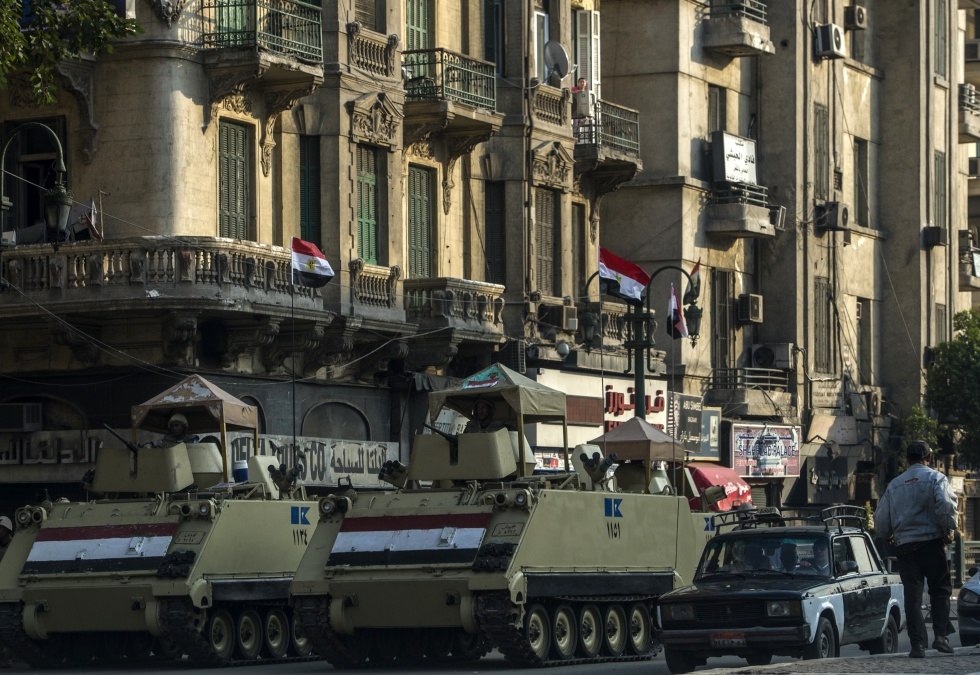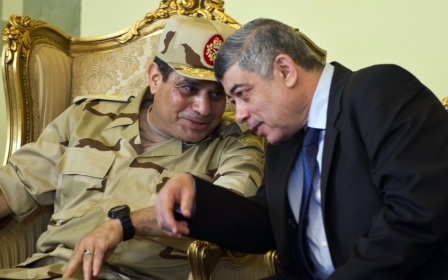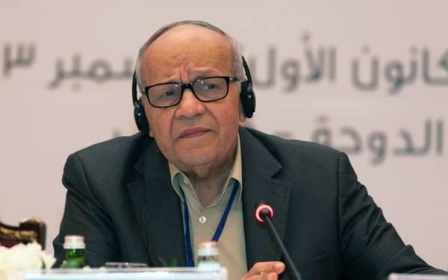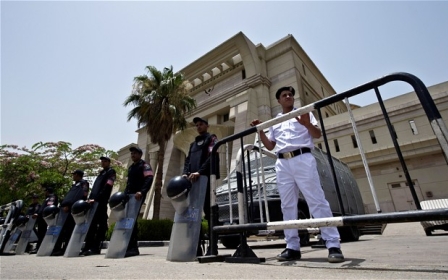Egypt police disperse anti-Mubarak rally in Cairo

Egyptian police on Friday dispersed a demonstration in Abdel-Moneim Riyad Square, adjacent to Cairo's flashpoint Tahrir Square where a protest was held last week after a court cleared ousted president Hosni Mubarak of charges that he had conspired to kill protesters in 2011.
Police used batons to disperse demonstrators, several of whom were arrested at random, eyewitnesses reported. Groups of people walking by Tahrir on Friday - whether intending to protest or not - were also told to break up and go their separate ways, MEE contributors on the ground reported.
The Interior Ministry has yet to comment on the incident with the demonstrators, but police usually disperse unauthorised protests in line with the controversial protest law regulating street demonstrations.
In a Thursday press conference, various groups including the National Alliance for the Defense of Legitimacy, the main support bloc of ousted president Mohamed Morsi, and a handful of youth-led groups had called for protests on Friday against the court ruling.
But on Friday, in the face of heightened security, plans changed, organisers said.
"We called off today's planned protests due to the heavy presence of security forces in and around the square," Zizo Abdou, a member of the April 6 youth movement, said.
Ahead of the expected Friday protests, Egyptian security forces closed off Tahrir and erected barbed wire barriers around the square, the epicentre of that popular revolution that ousted Mubarak in 2011.
Armoured vehicles was also deployed around the square and near the state television building, according to Anadolu Agency (AA). People who work in buildings on the square have been reportedly refused entry too.
Return to Tahrir
After the court announced its verdict last week, some 2,000 people gathered in protest near Tahrir Square. Security forces responded with water cannon, teargas and live fire to disperse crowds – at least three demonstrators were killed and numerous others injured.
On 30 November, students across the country also rallied against the court ruling, with clashes reported at Zagazig University and elsewhere.
Egypt’s prosecutor general has since announced an appeal against the decision.
In late 2012, Mubarak and his former interior minister, Habib al-Adly, were both sentenced to 25 years in prison for ordering the murder of hundreds of unarmed demonstrators during the 18-day uprising in 2011.
But the court subsequently ordered a retrial after Mubarak's lawyers successfully appealed the sentence.
Anti-Sisi coalition splits
Splits have emerged among Egypt’s opposition groups over a variety of issues including over allegations of sectarian rhetoric from certain religiously based groups.
Both the Independence Party and the Salafist Front have pulled out of the National Alliance for the Defense of Legitimacy for reasons that are as of yet unclear.
In a statement on Friday the Independence Party said they had been “mulling the decision to withdraw from the alliance for a whole year.”
Another Salafist group, the Al-Watan Party, had previously left the bloc in September.
Madr Masr, an independent Egyptian news site, has also reported that a number of revolutionary groups have rejected a call from a group called Muslim Brotherhood Youth, who say they are not an official Brotherhood affiliate, to form a “unity of revolutionary powers.”
The Revolutionary Socialists (RevSoc), a Marxist organisation in Egypt, stated that it would be impossible to cooperate while it was unclear what the demands of the group were.
“When we talk about collaboration with the Muslim Brotherhood, we have to ask two essential questions: collaboration with whom? And on what?” explained Mahmoud Ezzat, a member of the RevSoc political bureau.
He emphasised that they shared no common goals and that they rejected calls for the ousted Brotherhood leader Mohamed Morsi to be returned as President.
Both the Strong Egypt Party and the April 6 Youth movement have also rejected collaboration with the Brotherhood.
“There are no guarantees that the Brotherhood will keep its word,” Mohamed Othman, a leading Strong Egypt Party member, told Madr Masr. He said his party would not collaborate with the Muslim Brotherhood due to "the discourse of its current leaders".
"The situation now is much more complicated now than it was in 2011, when all political opposition forces worked together," he said.
The April 6 Youth movement emphasised that while it would be acceptable to work with Brotherhood activists on an individual level, there could be no official collaboration and that they would reject any calls for the return of Morsi as President.
New MEE newsletter: Jerusalem Dispatch
Sign up to get the latest insights and analysis on Israel-Palestine, alongside Turkey Unpacked and other MEE newsletters
Middle East Eye delivers independent and unrivalled coverage and analysis of the Middle East, North Africa and beyond. To learn more about republishing this content and the associated fees, please fill out this form. More about MEE can be found here.




